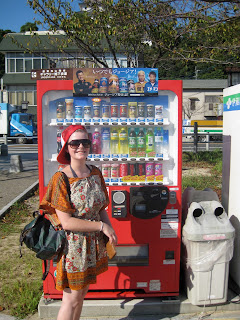23-25 September: Three day week, three day weekend
On Friday, Japan treated us to another public holiday, this time to celebrate the “autumnal equinox day”. Eiko-san, the lady who owns a small language school in Shimoori where I teach on Wednesdays, took me, Mashu-san and Henry-san on a day trip to Saga Prefecture. Together with one of her friends and two of her students, we piled into a mini bus and drove along the coast to a beach in Saga Prefecture, near Karatsu. We had lunch in a restaurant/shack, whilst our food was just hanging out by the window:
We had a very odd-looking creature for lunch, called something like turbine shell. I can't say it was the best thing I've ever eaten, but maybe I was just a little put off by its very––how shall I put it?––unappetising appearance. The second course was squid, which was very tasty.
The view from where we sat was quite lovely!
After lunch, we went to a little under water viewing platform, where we found lots and lots of fugu (blowfish), who didn't look poisonous at all, but really quite sweet. We also saw some tai, which look very oishii (delicious)!
fugu
tai
We had a quick look at the sea, where we found a bright red octopus just swimming about in the shallow water! Unfortunately, the little tako escaped before I could take a picture. We also found a sea anemone (I think), which looked pretty gross, and lots of limpets, hermit crabs and seaweed.
The next stop was karatsushiro, the castle near Karatsu. Haruka-san, Eiko-san's friend, decided that I would be the princess, Mashu-san my samurai and Henry-san my ninja. I found this a pretty decent arrangement.
Vending machines everywhere! And don't I look cool with my hat? It was given to us by the chancellor of the university.
This young lady here thinks she is the princess, but of course I know better.
View from the mountain! Looks just like Germany...with rice paddies and beautiful beaches and mountains near the sea...
Our group minus Henry-san
The last stop of the tour took us to our local onsen in Tenpaizan, my first proper onsen trip! It was good fun, although I should've really remember the modesty flannel. Oh well.
As we got back to Cambridge House, the others were getting ready to go to karaoke in Futsukaichi, and so we spontaneously decided to come along. We stayed for hours admiring the beauty of the karaoke bar's amateur music videos (see below) and the wonderful machine that you can use to order your drinks; who needs to talk to a real waiter after all?
We spent Saturday learning kanji in our "library", which is essentially a room with a couple of tables, dated computers and a few leftover books form previous Tsuzuki scholars. We discovered the incredibly helpful "Remembering the Kanji" by James Heisig, which teaches kanji in such a wonderful way that even I can remember the kanji for gall bladder.
On Sunday, we were invited to a party hosted by Naoya, a retired physiotherapist who is super keen on hanging out with foreigners and having international parties. It was all pretty mad; he had come up with some sort of programme for the afternoon: we listened to one of his friends singing some Japanese songs, then we had to sing some English songs, which was mildly embarrassing. Then, the girls had to learn a hula dance from two Japanese ladies and dance that in front of everyone, which was fairly embarrassing, very amusing, and a little infuriating, because neither of us was very keen to dance for the boys, the boys included. Then, Sara-san, Maddie-san and me got to try on a kimono, which was pretty damn cool. Naoya's friends who helped us put on the kimono were lovely. I can't say I'd be able to put one on myself, because it's so much work, and so much material seems to go into it: as the women took off the material round our middle, we counted 5 ribbons, two belts and one plastic thing, as well as the parcel at the back.
Kimono, complete with parcel and all
Grahame-san as a samurai

























































